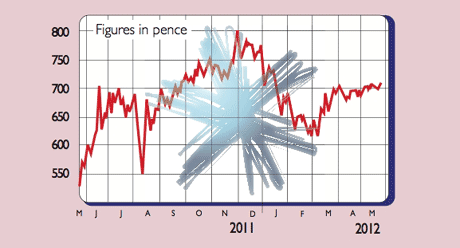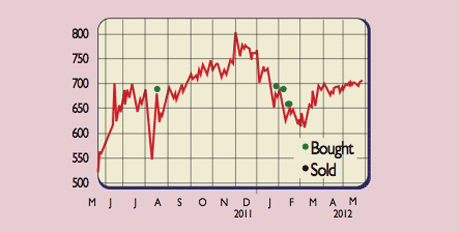Shares in focus: An innovative discount utility provider
Telecom Plus has a good strategy for growth, but faces stiff competition from larger rivals. Should you buy in? Phil Oakley investigates.
Get the latest financial news, insights and expert analysis from our award-winning MoneyWeek team, to help you understand what really matters when it comes to your finances.
You are now subscribed
Your newsletter sign-up was successful
Want to add more newsletters?

Twice daily
MoneyWeek
Get the latest financial news, insights and expert analysis from our award-winning MoneyWeek team, to help you understand what really matters when it comes to your finances.

Four times a week
Look After My Bills
Sign up to our free money-saving newsletter, filled with the latest news and expert advice to help you find the best tips and deals for managing your bills. Start saving today!
Telecom Plus has a good strategy for growth buy for the long term, says Phil Oakley.
The business
Telecom Plus trades under the name Utility Warehouse. It provides home telephone, broadband, mobile phone, gas and electricity services to households and small businesses. Most customers pay a monthly fee in order to get a discounted, single monthly bill. The discounts increase with the number of services taken.
Customers can make more savings by recommending new customers and by using a pre-paid Mastercard that gives 3%-7% cash-back for shopping at places such as Sainsbury's or Boots. Utility Warehouse does not advertise, but uses 37,000 distributors and word of mouth to gain new customers. These distributors are given good incentives and receive commission for every service taken by their customers for as long as they remain with the company.
MoneyWeek
Subscribe to MoneyWeek today and get your first six magazine issues absolutely FREE

Sign up to Money Morning
Don't miss the latest investment and personal finances news, market analysis, plus money-saving tips with our free twice-daily newsletter
Don't miss the latest investment and personal finances news, market analysis, plus money-saving tips with our free twice-daily newsletter
The history
The company was founded in 1996. Its first product was released a year later a gadget that helped customers to get cheaper phone calls than the ones offered by BT. In 1998, Charles Wigoder joined the company and set about turning it into a provider of utility services. While the firm has made consistent profits from telecoms, widely fluctuating gas and electricity prices meant that profits had been quite variable until new buying policies were put in place.
The company has attracted criticism on some consumer forums for its selling model. Nonetheless, consumer champion Which? has consistently praised Utility Warehouse for good customer service. The company has thrived since the last recession because many people have become distributors in order to earn extra income. Strong profits growth has followed as more customers have taken additional services from the company.
Who's in charge
Charles Wigoder is now the executive chairman, having joined Telecom Plus in 1998 after underwriting one of its rights issues. He started out as a chartered accountant before becoming an investment analyst in the City covering media stocks. In 1985, he became head of corporate finance at Carlton Communications.
His big break came in the late 1980s when he spotted the potential in selling mobile phones. He remortgaged his flat and set up Peoples Phone. The business was bought by Vodafone in 1996, netting Wigoder £6.5m.
Should you buy the shares?
Telecom Plus's different way of doing business makes it an interesting company, but can it keep growing? There's no doubt that it faces tough competition in telephony from the likes of BT and Sky. In utilities, British Gas, with its Nectar affiliation and competitive prices, is also a threat. Getting lots of customers to switch from these companies won't be easy. That said, the simplicity of a simple bill and the savings from its cashback card which can reduce its customers' monthly bills by 20%-30% could tempt cash-strapped households.
The company expects the number of services it provides to grow by 20% this year as customers continue to take extra services from them. But profits are forecast to grow by only 10% as costs rise. Stronger rates of profit growth are expected to return in 2014, albeit with lower profit margins as more sales come from gas and electricity.
The shares look expensive compared with Telecom Plus's profits, but if it can deliver the rates of profit growth forecast over the next two years, they begin to look more reasonable. If the company is successful in achieving its medium-term goal of increasing customers from the current 415,000 to more than a million, then the shares will look good value today. An added bonus with Telecom Plus is that it tends to pay out most of its profits to shareholders, making the shares a reasonable investment for income. We rate them a long-term buy.
The numbers

Stockmarket code: TEP
Share price: 707p
Market cap: £496m
Net assets (Dec 2011): £62.8m
Net cash (Dec 2011): £0.9m
P/e (current year estimate): 19.4 times
Yield (prospective): 4.2%
What the analysts say
Buy: 3
Hold: 1
Sell: 0
Average price target: 812p
Directors' shareholdings

C Wigoder: 13,281,041
A Lindsay: 81,465
J Schild: 97,624
Get the latest financial news, insights and expert analysis from our award-winning MoneyWeek team, to help you understand what really matters when it comes to your finances.
Phil spent 13 years as an investment analyst for both stockbroking and fund management companies.
-
 What is a care fees annuity and how much does it cost?
What is a care fees annuity and how much does it cost?How we will be cared for in our later years – and how much we are willing to pay for it – are conversations best had as early as possible. One option to cover the cost is a care fees annuity. We look at the pros and cons.
-
 How to navigate the inheritance tax paperwork maze in nine clear steps
How to navigate the inheritance tax paperwork maze in nine clear stepsFamilies who cope best with inheritance tax (IHT) paperwork are those who plan ahead, say experts. We look at all documents you need to gather, regardless of whether you have an IHT bill to pay.